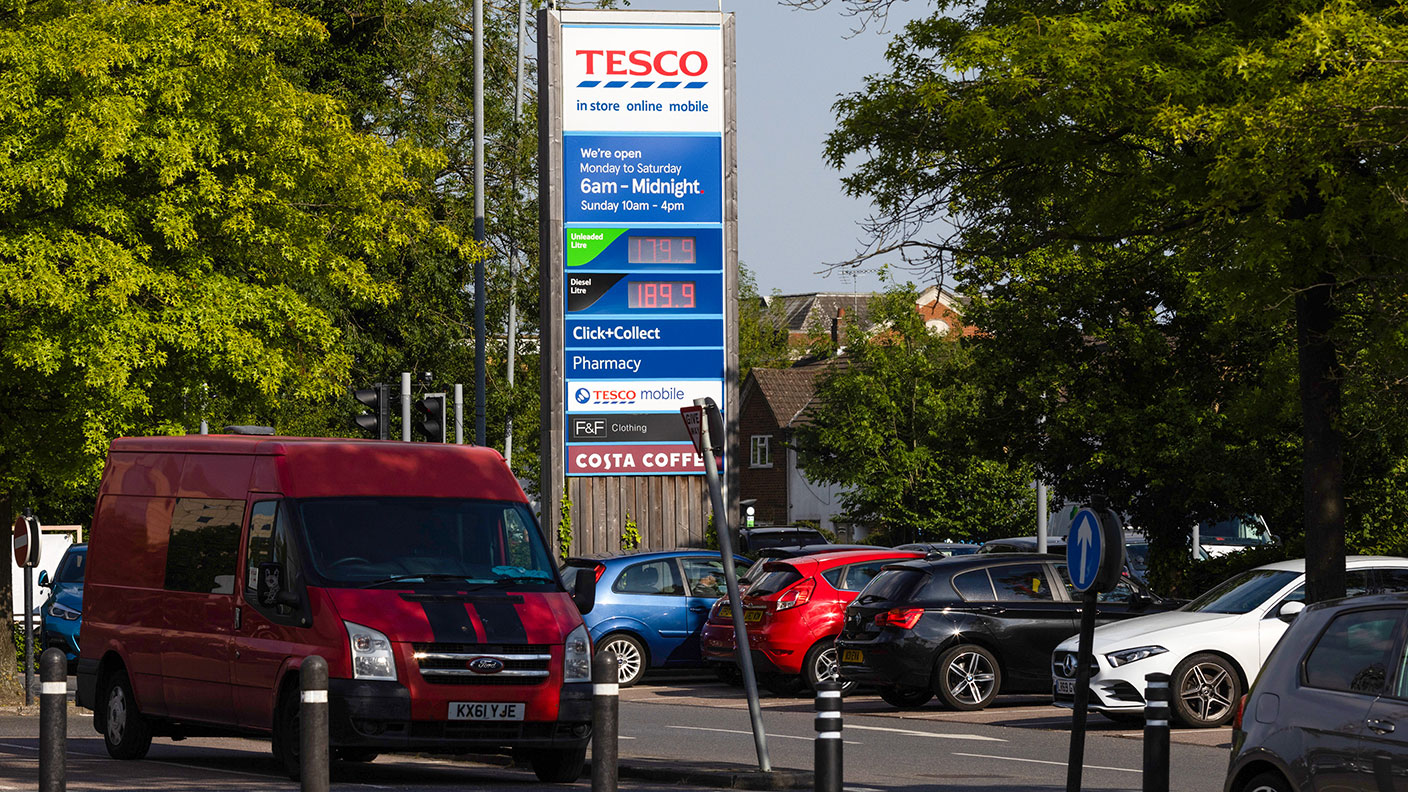Why petrol prices are higher than in 2008, despite lower oil prices now
The price of petrol is at an all-time high. Yet despite oil prices being higher in 2008, petrol was cheaper back then. Saloni Sardana explains why.


Get the latest financial news, insights and expert analysis from our award-winning MoneyWeek team, to help you understand what really matters when it comes to your finances.
You are now subscribed
Your newsletter sign-up was successful
Want to add more newsletters?

Twice daily
MoneyWeek
Get the latest financial news, insights and expert analysis from our award-winning MoneyWeek team, to help you understand what really matters when it comes to your finances.

Four times a week
Look After My Bills
Sign up to our free money-saving newsletter, filled with the latest news and expert advice to help you find the best tips and deals for managing your bills. Start saving today!
With energy prices going through the roof everywhere, it is no secret that consumers are feeling the pinch and having to pay higher prices to fill up their cars at petrol pumps.
Consumers in the UK have been hit particularly hard, and are now paying an average of £1.85 per litre to fill up their cars, says motoring organisation the RAC. The cost of filling an average family car with petrol is now more than £100.
As Arij Van Berkel of Lux Research points out, historically the spread between crude oil price and fuel price has been constant. But Brent crude oil is currently trading at $120 barrel, lower than it did in 2008, while petrol prices are much higher than then. So what is going on?
MoneyWeek
Subscribe to MoneyWeek today and get your first six magazine issues absolutely FREE

Sign up to Money Morning
Don't miss the latest investment and personal finances news, market analysis, plus money-saving tips with our free twice-daily newsletter
Don't miss the latest investment and personal finances news, market analysis, plus money-saving tips with our free twice-daily newsletter
A lack of refining capacity
Several experts tell MoneyWeek that a lack of crude oil refining capacity is driving higher petrol prices.
Competition among refining companies for market shares tends to keep fuel prices low. But this time, says Van Berkel, “there is no or very little appetite to invest in refining capacity and hence there’s not much appetite to increase market share”.
“Companies appear to just enjoy the ride and get high margins on fuels for as long as it lasts without wanting to fight for extra sales. This keeps the prices high and higher than one would expect based on past behaviour,” he adds.
The International Energy Agency predicts that oil demand could hit its peak as soon as 2025 due to the growth of electric vehicle sales, a factor which is curbing investment.
Craig Erlam, senior market analyst at OANDA, agrees that the lack of refining capacity is reflected through higher refining margins: “Margins are currently high due to a lack of capacity which is contributing to much higher prices at the pump.”
Ideally, refinery capacity would be higher and margins lower. “But sanctions on Russia and underinvestment everywhere else mean this isn’t the case,” says Erlam.
The sterling effect
Michael Hewson, chief market analyst at CMC Markets, notes petrol prices have not really changed in dollar terms – the strong dollar and weak sterling is another factor in pushing UK petrol prices higher.
The pound to dollar exchange rate was around $1.85 in 2008 – the pound is currently trading at just over $1.20. With oil priced in dollars, a weaker sterling means oil and petrol are more expensive in sterling terms.
Why was the price of oil higher in 2008 than now?
Oil prices have risen in recent months due to higher demand following months of Covid lockdowns and Russia’s invasion of Ukraine. But the oil price has still failed to breach its all-time high of $147.50 in July 2008.
Why?
Susannah Streeter, senior investment and markets analyst at Hargreaves Lansdown, says oil prices are lower now because of the point we were at in the global business cycle and because “global oil production was stagnating”. In addition, stronger demand from the “Brics” countries – Brazil, Russia, India, China and South Africa – played a part in 2008.
But according to Streeter, even though oil prices are lower now than they were in 2008 this is likely to change because of the removal of Russian oil from the market. Russia is the world’s third largest supplier of crude oil after Saudi Arabia and the US. The EU imports more than 40% of its gas and 29% of its oil from Russia, but is to impose a ban on most Russian oil imports by the end of the year. The US has taken a more stringent approach and has banned Russian oil completely.
So even if oil cartel Opec were to “open its taps, it wouldn’t make up for Russia’s supply in the market,” says Streeter.
SEE ALSO:
The cost of petrol in the UK compared with the rest of the world
What makes up the price of a litre of petrol?
How to cut your car’s fuel bill as the price of petrol hits a record high
Get the latest financial news, insights and expert analysis from our award-winning MoneyWeek team, to help you understand what really matters when it comes to your finances.
Saloni is a web writer for MoneyWeek focusing on personal finance and global financial markets. Her work has appeared in FTAdviser (part of the Financial Times), Business Insider and City A.M, among other publications. She holds a masters in international journalism from City, University of London.
Follow her on Twitter at @sardana_saloni
-
 Should you buy an active ETF?
Should you buy an active ETF?ETFs are often mischaracterised as passive products, but they can be a convenient way to add active management to your portfolio
-
 Power up your pension before 5 April – easy ways to save before the tax year end
Power up your pension before 5 April – easy ways to save before the tax year endWith the end of the tax year looming, pension savers currently have a window to review and maximise what’s going into their retirement funds – we look at how
-
 No peace dividend in Trump's Ukraine plan
No peace dividend in Trump's Ukraine planOpinion An end to fighting in Ukraine will hurt defence shares in the short term, but the boom is likely to continue given US isolationism, says Matthew Lynn
-
 Investors need to get ready for an age of uncertainty and upheaval
Investors need to get ready for an age of uncertainty and upheavalTectonic geopolitical and economic shifts are underway. Investors need to consider a range of tools when positioning portfolios to accommodate these changes
-
 Ukraine invades Russia – what are the political implications?
Ukraine invades Russia – what are the political implications?Ukraine's surprise invasion into Kursk could change the course of the war politically
-
 UK wages grow at a record pace
UK wages grow at a record paceThe latest UK wages data will add pressure on the BoE to push interest rates even higher.
-
 Trapped in a time of zombie government
Trapped in a time of zombie governmentIt’s not just companies that are eking out an existence, says Max King. The state is in the twilight zone too.
-
 America is in deep denial over debt
America is in deep denial over debtThe downgrade in America’s credit rating was much criticised by the US government, says Alex Rankine. But was it a long time coming?
-
 UK economy avoids stagnation with surprise growth
UK economy avoids stagnation with surprise growthGross domestic product increased by 0.2% in the second quarter and by 0.5% in June
-
 Bank of England raises interest rates to 5.25%
Bank of England raises interest rates to 5.25%The Bank has hiked rates from 5% to 5.25%, marking the 14th increase in a row. We explain what it means for savers and homeowners - and whether more rate rises are on the horizon
